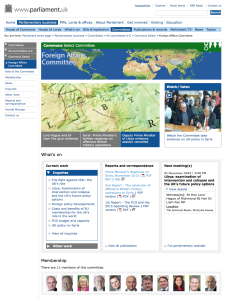
Last night on Wycombe Sound, I promised to make available the Prime Minister’s response to the Foreign Affairs Committee’s inquiry on Syria.
The inquiry produced the report The extension of offensive British military operations to Syria (PDF). It concluded:
In the face of a humanitarian and security catastrophe, there is a powerful sense that something must be done in Syria. We agree that it is a key British national interest to defeat ISIL and we consider this to be a necessary goal for the UK. However, we believe that there should be no extension of British military action into Syria unless there is a coherent international strategy that has a realistic chance of defeating ISIL and of ending the civil war in Syria. We consider that the focus on the extension of airstrikes against ISIL in Syria is a distraction from the much bigger and more important task of nding a resolution to the con ict in Syria and thereby removing one of the main facilitators of ISIL’s rise. We were not persuaded by the Government’s attempts to treat ISIL in Syria and the broader Syrian civil war as separate issues, and note that our witnesses called for a more joined-up strategy to tackle closely interlinked crises.
Finally, we set out seven points on which the Government should provide further explanation before asking the House to approve a motion authorising military action. We are not yet persuaded that it is possible for the Government to provide a satisfactory explanation of these points at present. Until it can, we recommend that it does not bring to the House a motion seeking the extension of British military action to Syria.
The Prime Minister’s memorandum in response may be found here. It is a direct reply to that report in the context of circumstances changed dramatically by the Paris attacks. The response opens:
Whether or not to use military force is one of the most significant decisions that any government takes. The need to do so most often arises because of a government’s first duty: the responsibility to protect its citizens.
Decisions to use force are not to be taken lightly. It is right that Parliament, on behalf of the people, asks difficult questions and holds the Government to account. For its part, it is important that the Government should listen and learn. But it is also vital that the Government can act to keep this country safe.
Throughout Britain’s history, we have been called on time and again to make the hardest of decisions in defence of our citizens and our country. Today one of the greatest threats we face to our security is the threat from ISIL.
Again as I said on the radio, my position on the spectrum of opinion in the Conservative Parliamentary Party is at the sceptical and reluctant end. However, the Paris attacks provide just cause for the defence of an ally, there is no doubt we face the same threat and I have a duty to ensure the people of Wycombe and the UK are secure against those with whom there is no possibility of negotiation. The Government’s response rules out attacking the Syrian regime and the deployment of British ground troops is considered counterproductive.
I have some remaining questions about the conflict between our own political strategy and Russia’s which I will be taking up on Monday. I will make my final decision on how to vote when I can see the precise text of the motion before the House.


















